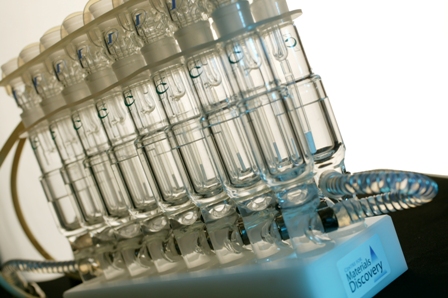A number of industry collaborations with the University are on track to receive an award from the Regional Growth Fund.
The Regional Growth Fund is a £1.4bn three-year fund operating across England to stimulate private sector-led sustainable economic growth and employment, provided by the Department for Business, Innovation and Skills.
A partnership involving the University, Unilever and AB Sugar is in line to receive £2.83 million to build a micro-refinery at the University and develop alternatives to petrochemical feedstocks for Unilever products.
The project aims to promote environmentally sustainable operations and presents the University with a unique opportunity to extend its Centre for Materials Discovery (CMD) to include high-throughput bio-refining, creating a unique facility in the UK.
The £9.6 million CMD enables industries to move rapidly into the next generation of manufacturing novel materials. The new funding will enable the University to expand the CMD with an integrated high-throughput bio-refinery unit that will provide isolated polymer building blocks from biomass feedstocks. This will allow functional polymers to be synthesised to replace current petrochemical polymers across home and personal care products.
Director of Partnerships and Innovation, John Flamson, said: “This is excellent news. These exciting projects are evidence of the University’s strength in industry collaboration and will enhance the city region’s reputation as a leading centre for next-generation science.”
The ‘GAMMA’ project is also set to receive £4.4 million funding. GAMMA (Growing Autonomous System Mission Management Applications) is a technology and next generation supply chain development programme led by the North West Aerospace Alliance in partnership with the University’s Virtual Engineering Centre, BAE Systems and the Universities of Manchester, Lancaster, Salford, Central Lancashire and the National Nuclear Laboratories.
Autonomous systems are technology-based solutions for replacing humans in tasks that are predominantly mundane, dangerous and dirty, or detailed and precise, and can be in the air, on land or in sub-sea environments. There is significant market growth forecast in the development of systems across a wide range of sectors including environmental and earth science, energy – including nuclear and petrochemical – and transport.
A third project by Redx Pharma, based at the MerseyBIO incubator which is run by the University, is on track to receive £5.9 million funding. Redx Pharma plans to develop an Oncology Medicinal Chemistry Centre, and the funding will help finance an initial two-year research and development phase into promising new drugs for the treatment of cancer.
The University has offered support for the project which is also backed by Liverpool Vision, the Mersey Partnership, the Royal Liverpool University Hospital and the planned North Liverpool Life Sciences University Technical College.
